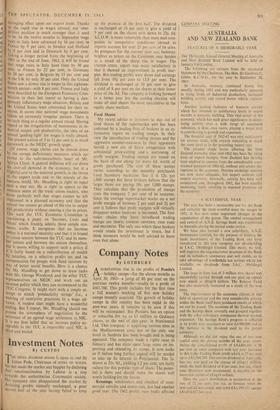investment Notes
By CUSTOS
THE STEEL dividend season is upon us and Sir Julian Pode, Chairman of STEEL OF WALES, has not made the market any happier by declaring that renationalisation by Labour is a step towards the authoritarian Communist society. His company also disappointed the market by declaring profits virtually unchanged, a poor second half of the year having failed to keep up the promise of the first half. The dividend is unchanged at 10 per cent to give a yield of 9 per cent on the shares now down to 22s. 6d. S.C.O.W. is more vulnerable than most steel com- panies to competitive conditions abroad as exports account for over 25 per cent of its sales. Its prospects for the current year ale, however, brighter as prices on the Continent may harden as a result of the sharp rise in wages. The UNITED STEEL report was more satisfactory in that it showed an improvement in profit mar- gins. But trading profits were down and earnings fell from 181 per cent to 13.9 per cent. The dividend is unchanged at 10 per cent to give a yield of 8 per cent on the shares at their lower price of 24s. 9d. The company is looking forward to a better year but the coming election will make all steel shares the most speculative in the equity share markets.
Food Shares
My recent advice to investors to stay out of food shares of the supermarket sort has been endorsed by a leading firm of brokers in an in- formative report on trading stamps. In their view the introduction of trading stamps and the aggressive counter-measures by their opponents herald a new era of fierce competition with substantial price-cutting and a narrowing of profit margins. Trading stamps are issued on the basis of one stamp for every 6d. worth of goods purchased. The 'cost of these stamps varies according to the quantity pufchased. Lord Sainsbury maintains that it is 12s. per 1,000 stamps but these brokers believe that the larger firms are paying 10s. per 1,000 stamps. They calculate that the promotion of stamps costs the company 2 per cent of its turnover. Since the average supermarket works on a net profit margin of between 2 per cent and 2.4 per cent it follows that profit margins will virtually disappear unless turnover is increased. The four major chains who have introduced trading stamps are TESCO, LONDON GROCERS, FINE FARE and PRICERTTE. The only one which these brokers would retain for investment is TESCO, but I think investors would be well advised to leave even that alone.






































 Previous page
Previous page